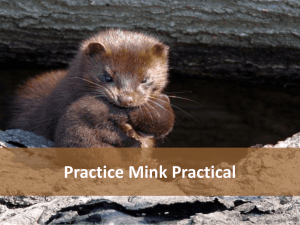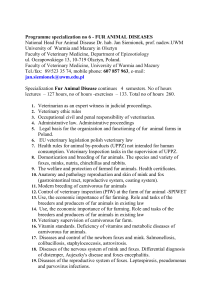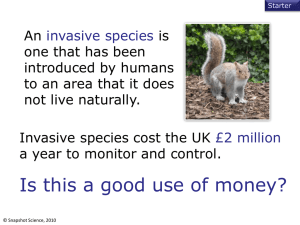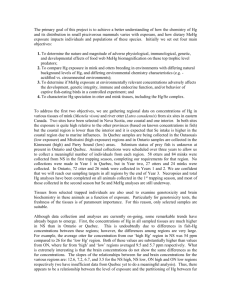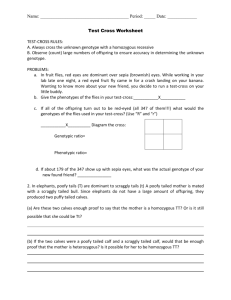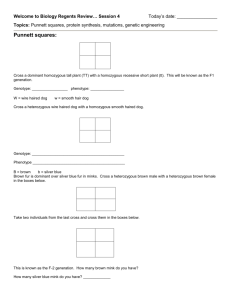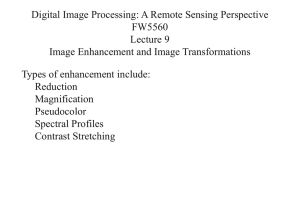G/TBT/N/NLD/80
advertisement
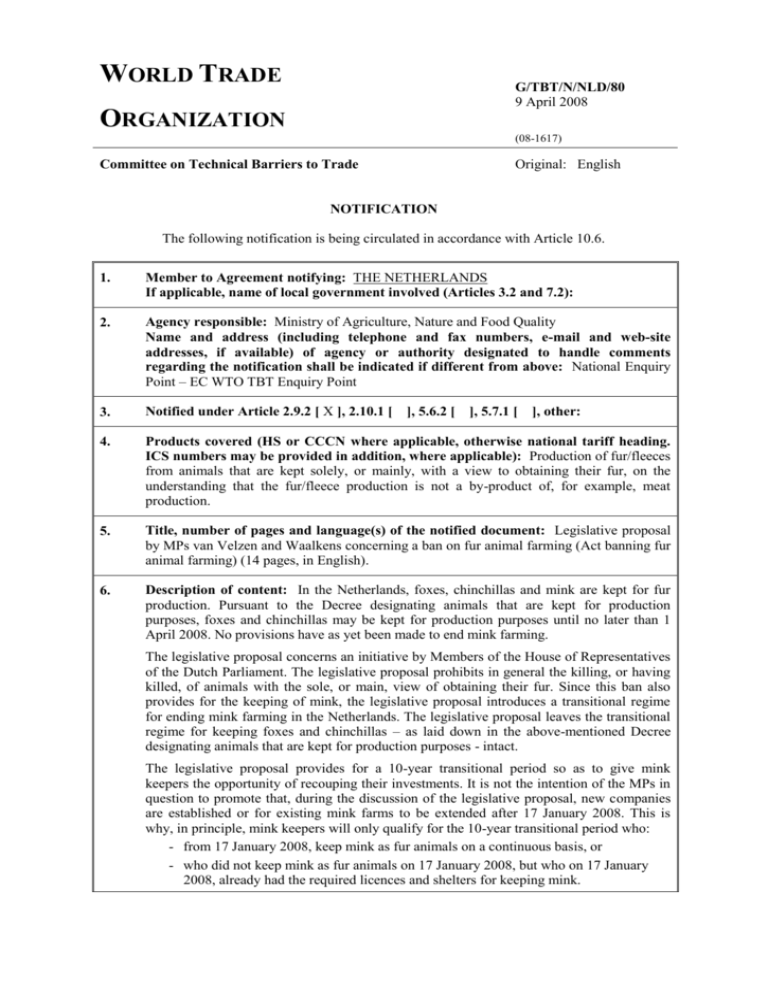
WORLD TRADE G/TBT/N/NLD/80 9 April 2008 ORGANIZATION (08-1617) Committee on Technical Barriers to Trade Original: English NOTIFICATION The following notification is being circulated in accordance with Article 10.6. 1. Member to Agreement notifying: THE NETHERLANDS If applicable, name of local government involved (Articles 3.2 and 7.2): 2. Agency responsible: Ministry of Agriculture, Nature and Food Quality Name and address (including telephone and fax numbers, e-mail and web-site addresses, if available) of agency or authority designated to handle comments regarding the notification shall be indicated if different from above: National Enquiry Point – EC WTO TBT Enquiry Point 3. Notified under Article 2.9.2 [ X ], 2.10.1 [ ], 5.6.2 [ ], 5.7.1 [ ], other: 4. Products covered (HS or CCCN where applicable, otherwise national tariff heading. ICS numbers may be provided in addition, where applicable): Production of fur/fleeces from animals that are kept solely, or mainly, with a view to obtaining their fur, on the understanding that the fur/fleece production is not a by-product of, for example, meat production. 5. Title, number of pages and language(s) of the notified document: Legislative proposal by MPs van Velzen and Waalkens concerning a ban on fur animal farming (Act banning fur animal farming) (14 pages, in English). 6. Description of content: In the Netherlands, foxes, chinchillas and mink are kept for fur production. Pursuant to the Decree designating animals that are kept for production purposes, foxes and chinchillas may be kept for production purposes until no later than 1 April 2008. No provisions have as yet been made to end mink farming. The legislative proposal concerns an initiative by Members of the House of Representatives of the Dutch Parliament. The legislative proposal prohibits in general the killing, or having killed, of animals with the sole, or main, view of obtaining their fur. Since this ban also provides for the keeping of mink, the legislative proposal introduces a transitional regime for ending mink farming in the Netherlands. The legislative proposal leaves the transitional regime for keeping foxes and chinchillas – as laid down in the above-mentioned Decree designating animals that are kept for production purposes - intact. The legislative proposal provides for a 10-year transitional period so as to give mink keepers the opportunity of recouping their investments. It is not the intention of the MPs in question to promote that, during the discussion of the legislative proposal, new companies are established or for existing mink farms to be extended after 17 January 2008. This is why, in principle, mink keepers will only qualify for the 10-year transitional period who: - from 17 January 2008, keep mink as fur animals on a continuous basis, or - who did not keep mink as fur animals on 17 January 2008, but who on 17 January 2008, already had the required licences and shelters for keeping mink. G/TBT/N/NLD/80 Page 2 In order to do justice to the intention to end mink farming indefinitely in due course, those who have taken over a mink farm after 17 January 2008 will not qualify for transitional legislation, unless the transfer has taken place under extenuating circumstances on the part of the transferring party. Extenuating circumstances, however, apply only when the mink farmer is suffering great financial damage because: - as a result of sudden incapacity for work, he is no longer in a position to keep mink, - the mink farm forms part of a community to be divided and the mink farm, as equity capital, has to be sold in order to be able to divide the community, or - upon reaching the age of 65, he is not prepared, or unable, to continue the mink farm. When there are no extenuating circumstances, transfer of a mink farm after 17 January 2008 means that the party obtaining the mink farm will, once the legislative proposal has entered into effect, not qualify for the transitional period and will need to cease the mink farm activities. Mink farmers are, of course, free to close down their mink farms prematurely or convert them into other businesses. Conditions to qualify for the transitional period In order to qualify for the transitional period, mink farmers must notify the Minister for Agriculture, Nature and Food Quality within four weeks of the Act entering into effect. They need to impart the following information: - the number of mink they are allowed to keep in accordance with their licences; - the number of shelters that were available on 17 January 2008 at the mink farm; - the number of mink they keep at the time of registration; - the place, or places, where the mink are kept on 17 January 2008; and - the place, or places, where the mink are kept at the time of registration. Moreover, they must meet the following conditions during the transitional period: - they need to have complied with the above-mentioned notification obligation; - they need to keep the mink in a shelter that at least meets the requirements laid down in the Regulation on standards for welfare standards for mink (PPE) 2003, as these read on 17 January 2008; - they must not at any time keep more mink than the number of mink for which a licence, as referred to in Article 8.1 of the Environmental Management Act, has been issued; - they must not at any time keep more mink than the number of shelters which were available on 17 January 2008 for keeping this type of mink at the mink farm, and - they must keep the mink at the same location as that at which mink were kept at the time of notification, or at another location, provided that the old location has ceased to be a mink farm and this move has been notified to our Minister. In order to avoid any misunderstanding, it is noted that the initiative proposal only pertains to fur animals that are kept commercially with a view to producing fur. The keeping of animals other than for the production of fur, such as the keeping of an animal as a pet, will remain permitted. Equally, the keeping of animals whose fur is obtained as a by-product of, for example, meat production, is not prohibited. Articles 2, 3 and 4 may contain technical regulations. G/TBT/N/NLD/80 Page 3 7. Objective and rationale, including the nature of urgent problems where applicable: The keeping of animals with the sole aim of obtaining their – economically – valuable fur, is, for the following reasons, unacceptable. The production of fur is different from the production of foodstuffs in that the production of fur does not serve a basic human need. If the production of fur is the only goal, it is unnecessary to compromise animal welfare in any way. Moreover, alternatives to fur are available. In the Netherlands, foxes, chinchillas and mink are kept for fur production. Pursuant to the Decree designating animals that are kept for production purposes, foxes and chinchillas may be kept for production purposes until no later than 1 April 2008. No provisions have as yet been made to end mink farming. The present legislative proposal provides for this. The present legislative proposal expounds the outlined moral stance which is not primarily guided by the nature of the animal species involved but by the objective of the farm. What is certain is that if the production of fur is the goal, it is unnecessary to compromise animal welfare in any way. This is therefore also the reason why the present legislative proposal is not prepared to tighten animal welfare or other requirements. By way of conclusion, it is noted that there is no need to include a mutual recognition clause in the legislative proposal. The legislative proposal has no impact on the import of fur that has been brought onto the market of another Member State in a lawful manner. 8. Relevant documents: Parliamentary Papers II, 2007-2008, 30 826 No 1 to 8 (preliminary letter, legislative proposal, explanatory notes, letter by MP Van Velzen, letter by MPs Van Velzen and Waalkens, recommendation by Council of State and reaction by submitting parties, legislative proposal as amended further to the recommendation of the Council of State, explanatory notes as amended further to the recommendation of the Council of State). 9. Proposed date of adoption: Proposed date of entry into force: 10. Final date for comments: 23 June 2008 11. Texts available from: National enquiry point [ X ] or address, telephone and fax numbers, e-mail and web-site addresses, if available of the other body: http://europa.eu.int/comm/enterprise/tbt/ -
